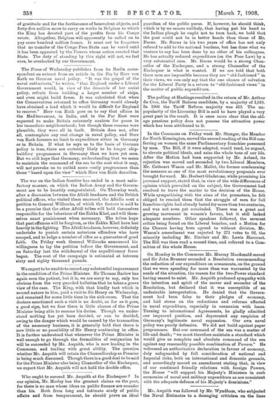On Monday in the Commons Mr. Murray Macdonald moved and
Sir John Brunner seconded a Resolution recommending the reduction of our expenditure on armaments, on the ground that we were spending far more than was warranted by the needs of the situation, the reason for the two-Power standard having ceased to exist. Mr. Asquith professed sympathy with the intention and spirit of the mover and seconder of the Resolution, but declared that it was susceptible of an undesirable interpretation. He denied that the Govern- ment had been false to their pledges of economy, and laid stress on the reductions and reforms effected in naval expenditure, especially in connexion with loans. Turning to international Agreements, he gladly admitted our improved position, and deprecated any suspicion of Germany's legitimate naval expansion. Our own naval policy was purely defensive. We did not build against paper programmes. But our command of the sea was a matter of life and death ; "we must therefore maintain a standard which would give us complete and absolute command of the sea against any reasonably possible combination of Powers." He welcomed an authoritative declaration in favour of economy, duly safeguarded by full consideration of national and Imperial risks, both on international and domestic grounds, and accordingly moved an amendment stating that, in view of our continued friendly relations with foreign Powers, the House "will. support his Majesty's Ministers in such economies of naval and military expenditure as are consistent with the adequate defence of his Majesty's dominions."














































 Previous page
Previous page